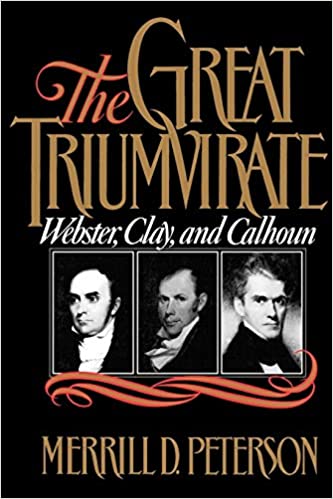By Merrill D. Peterson (NHC Fellow, 1980–81)

New York: Oxford University Press, 1987
From the publisher’s description:
Enormously powerful, intensely ambitious, the very personifications of their respective regions--Daniel Webster, Henry Clay, and John C. Calhoun represented the foremost statemen of their age. In the decades preceding the Civil War, they dominated American congressional politics as no other figures have. Now Merrill D. Peterson, one of our most gifted historians, brilliantly re-creates the lives and times of these great men in this monumental collective biography.
Arriving on the national scene at the onset of the War of 1812 and departing political life during the ordeal of the Union in 1850-52, Webster, Clay, and Calhoun opened--and closed--a new era in American politics. In outlook and style, they represented startling contrasts: Webster, the Federalist and staunch New England defender of the Union; Clay, the "war hawk" and National Rebublican leader from the West; Calhoun, the youthful nationalist who became the foremost spokesman of the South and slavery. They came together in the Senate for the first time in 1832, united in their opposition of Andrew Jackson, and thus gave birth to the idea of the "Great Triumvirate." Entering the history books, this idea survived the test of time because these men divided so much of American politics between them for so long.
Peterson brings to life the great events in which the Triumvirate figured so prominently, including the debates on Clay's American System, the Missouri Compromise, the Webster-Hayne debate, the Bank War, the Webster-Ashburton Treaty, the annexation of Texas, and the Compromise of 1850. At once a sweeping narrative and a penetrating study of non-presidential leadership, this book offers an indelible picture of this conservative era in which statesmen viewed the preservation of the legacy of free government inherited from the Founding Fathers as their principal mission. In fascinating detail, Peterson demonstrates how precisely Webster, Clay, and Calhoun exemplify three facets of this national mind.
Subjects
History / American History / United States Government / United States Congress / United States Politics / Henry Clay / John C. Calhoun / Daniel Webster /Peterson, Merrill D. (NHC Fellow, 1980–81). The Great Triumvirate: Webster, Clay, and Calhoun. New York: Oxford University Press, 1987.